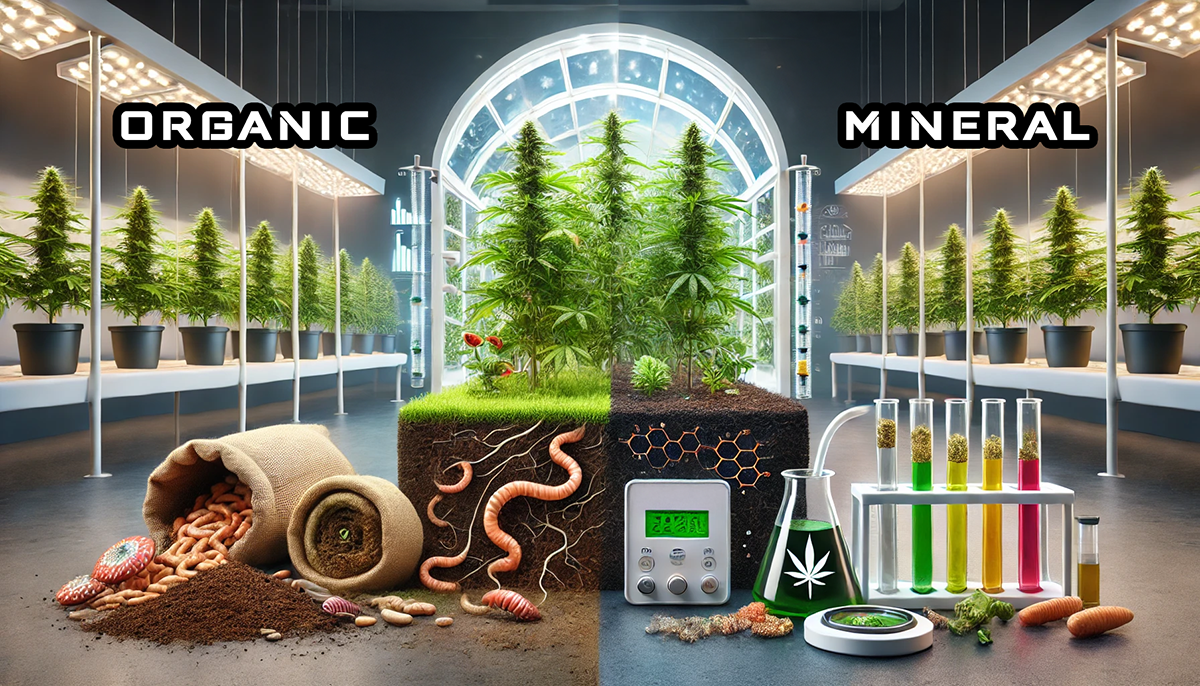Biological vs. Mineral: Choosing the Right Fertilizer for Cannabis

Why Fertilizer Choice is Crucial
Choosing the right fertilizer plays a crucial role in cannabis cultivation. Whether biological or mineral, both options have specific advantages and disadvantages that impact plant growth, yield, and the environment. In this article, we explore the differences and help you find the optimal fertilization method for your plants.
Key Insights
-
Nitrogen, phosphorus, and potassium are essential nutrients for cannabis.
-
Fertilizer choice influences terpene and cannabinoid profiles.
-
Organic fertilizers promote sustainable soil health.
-
Mineral fertilizers provide immediate nutrients but may disrupt soil life.
-
Brands like BioBizz, Advanced Nutrients, and General Hydroponics offer specialized products.
The Role of Fertilizers in Cannabis Cultivation
Nutrient Requirements in Different Growth Phases
Cannabis requires targeted nutrient supply, which varies depending on the growth phase:
| Nutrient | Vegetative Phase | Flowering Phase |
|---|---|---|
| Nitrogen (N) | High | Low |
| Phosphorus (P) | Medium | High |
| Potassium (K) | Medium | Very high |
Understanding nutrient needs facilitates the selection of the right fertilizer, optimizing plant growth.
Organic vs. Mineral Fertilizers: A Comparison
Organic Fertilizers
Organic fertilizers originate from natural sources such as compost, bone meal, or worm humus. They improve soil structure and support microbiomes by slowly releasing nutrients.
Advantages:
-
Environmentally friendly and sustainable
-
Enhance soil quality and microbial life
-
Reduce the risk of over-fertilization
Disadvantages:
-
Slow nutrient release
-
Higher costs compared to mineral fertilizers
Mineral Fertilizers
Mineral fertilizers are industrially manufactured products that provide immediately available nutrients. They are particularly suitable for fast-growing plants and hydroponic systems.
Advantages:
-
Rapidly available nutrients
-
Precise dosage possible
-
Particularly suitable for indoor and hydroponic cultivation
Disadvantages:
-
Can harm soil life
-
Increased risk of over-fertilization
-
Potential environmental pollution
| Parameter | Organic Fertilizer | Mineral Fertilizer |
| Nutrient Release | Slow | Fast |
| Soil Health | Improved | Can be impaired |
| Environmental Friendliness | High | Possible pollution |
Sustainability and Environmental Aspects
Organic fertilizers contribute to long-term soil fertility by promoting soil microbiology and naturally recycling nutrients. In contrast, mineral fertilizers can disrupt soil life and contribute to water contamination through runoff.
Economic Efficiency: Cost vs. Benefit
Mineral fertilizers are usually cheaper and act quickly, whereas organic fertilizers contribute to soil improvement in the long run and can thus be more cost-efficient over time.
Cost Comparison:
-
Organic Fertilizers: Higher initial cost, long-term economic benefits
-
Mineral Fertilizers: Lower upfront cost but require more frequent application
Conclusion: Which Fertilization Method is Best?
The choice between organic and mineral fertilizers depends on individual cultivation goals. Organic fertilizers offer sustainable benefits for soil and the environment, while mineral fertilizers ensure a quick and precise nutrient supply. A combination of both methods can maximize the advantages.
Tip: If you prioritize sustainable cultivation and long-term soil health, organic fertilizers are the best option. For rapid growth and targeted nutrient supply, mineral fertilizers are more effective.
Recommended Fertilizer on Cannadusa
Plagron Top Grow Box Terra - 64,00€
Plagron Top Grow Box Natural - 74,00€
Athena Pro Line Mix Kit - 110,00€
Recent posts
Author
Contents
© 2024 - 2025 Cannadusa. Powered by Medusa Engineering GmbH
• Impressum • AGB • Datenschutz • Compliance


